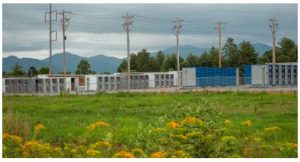UPDATE on the Meeting in Harrison TODAY 4/25/2023 1:00pm & Dangers of Cryptocurrency Data Mining with Chinese Communist Party

UPDATE! The Harrison, Arkansas, area may have dodged a bullet today (April 25, 2023) when the Harrison Planning Commission did not call for a vote on the environmentally-polluting cryptocurrency mining facility, a data center which would be a stressor for our U.S. and Arkansas power grid. Here was the agenda from today’s Planning Commission hearing.
HUNDREDS of people turned out for the meeting today demanding that the dangerous crypto-mining site be stopped. Here was the letter from the Harrison Mayor Jerry Jackson available to the outraged public.

Only a certain number of people were allowed inside the hearing, and shown above is the overflow of people into the lobby. Many more people stood outside.
KY3 reports: Harrison, Ark., data mining center on hold after planning and zoning meet
Some excerpts:
Many people are concerned about a possible new business in Harrison, Arkansas. Planning and zoning took up the proposed cryptocurrency mining center Tuesday.
The area where the proposed building will be is zoned as industrial. Crypto mining is such a new industry no one is really sure if it fits under zoning for industrial. Tuesday’s meeting was supposed to decide that, though, after hours of public comment, the committee said they would look at deciding next month.
Mayor Jerry Jackson also expressed his feelings on the project during the meeting, speaking out against it.
We hope that Mayor Jackson is sincere.
We need to be concerned about the draw upon our electrical grid and the rising prices of electrical power, for now and into the future.
Crypto Mining Poses Challenges to Public Power Utilities
Fitch Ratings-New York/San Francisco/Austin- 24 January 2022:
Digital asset or crypto currency mining in the US could pose power supply risks to public power utilities unless they are sufficiently mitigated, Fitch Ratings says. Crypto mining is energy intensive and requires a considerable amount of power that can significantly increase a utility’s overall electrical load. Utilities must balance the revenue prospect of increased electrical sales with the commitment to procure or generate large amounts of power for crypto mining operations.
Also, the noise pollution alone could destroy the area where you are living.
And that’s not all that’s at stake.
Utility Companies Face Credit Risk from Bankruptcies of Crypto Miners
While there are many types of cryptocurrency, the most popular and valuable digital currency is Bitcoin. To create or “mine” Bitcoin, a company needs two things: (i) many powerful computers constantly connected to and working for the Bitcoin network or “blockchain” and (ii) access to substantial amounts of electricity to operate (and cool) those computers. Because of this steady demand, utility companies with more capacity than demand have sought out crypto mining companies as customers. In exchange for this usage, utility companies offer miners favorable rates for electricity and may build out the infrastructure necessary to deliver the requested power.
However, recent volatility in the cryptocurrency markets[1] has forced some cryptocurrency brokers/miners into bankruptcy, and these filings highlight the credit risk that utilities face when a significant customer ceases operations or files bankruptcy. For example, Core Scientific, Inc. and related companies (“Core”) – recently filed a Chapter 11 bankruptcy. As part of its bankruptcy filings, Core stated that its total average monthly bill for electricity was more than $24 million dollars split between seven providers. Prior to the bankruptcy, Core had either posted deposits with its providers or was pre-paying for the following week’s estimated usage.
This is a huge risk for them.
You can bet that there will be skyrocketing price hikes on electricity bills for us as consumers as well if this mining facility moves forward. And expect brown-outs and black outs. Complete outages!
From the two reports linked above, one can see that we do NOT need crypto mining in our natural state… or any other state in the U.S. This needs to be STOPPED, and we need to do everything we can to get them out of this country.
There are still many questions that remain unanswered, like:
- Why in the world did Arkansas Governor Sarah Huckabee Sanders sign Act 819 entitled “An Act to Provide Sales and Use Tax Exemptions for Data Centers; to Provide a Sales and Use Tax Exemption for Data Center Equipment, Data Center Costs, Certain Services Provided to a Data Center, and Electricity Used by a Data Center; and for Other Purposes” ?
- Where was Entergy today? We need answers!
- Why are we allowing a communist entity to purchase land and operate a business — one that connects to our very important electrical grid — on our sovereign U.S. soil? Remember, this is CHINA we’re talking about…
Our cities and counties are being THREATENED that they have to vote for this type of Bitcoin mining in their area. We do not need to allow this to continue. Once these mining companies get their claws into an area, they won’t let it go before it’s picked apart.
Our new governor needs to stand AGAINST this type of crypto mining, and these laws regarding digital mining (like Act 819 and Act 851 that were passed this month) need to be repealed!
There’s a reason why Communist China kicked the Bitcoin miners out in 2021…
Could this be another reason why China is in our country — to strain or bring our U.S. power grid down — which will force more windmills and solar panels?
We believe that these are skillfully targeted attacks on our grid.
Remember, we will uncover more with our investigation, so stay tuned for a more-thorough article…
Directly below is our article from earlier today.
——————————-
Problems the Natural State is facing with dangerous cryptocurrency data mining after Arkansas Governor Sarah Huckabee Sanders signed the malevolent HB1799 into effect on April 13, 2023. It is now Act 851. (Here’s the bill history.)
Is Arkansans facing some serious health issues? Yes!
Here’s a picture of the PrimeBlock crypto mine in Murphy, N.C.
.
A meeting that you cannot afford to miss if you’re concerned about your property, your real estate, your family’s health, and what’s going on near you:
A public hearing
Harrison Planning Commission
TODAY! April 25, 2023 at 1:00 pm
Harrison City Hall, 118 Industrial Park Road
Harrison, ArkansasAll interested persons are invited to attend the meeting and participate in the discussion or send written comments to the planning commission, P.O. Box 1715, Harrison, AR 72602.
The application and related backup material are on file in the Public Works Department 870-741-3434.
Pine Bluff rejected the data mining hub. Thank goodness!
However, Newport Economic Developers embraced bitcoin mining.
Vilonia has just approved the Bitcoin site.
Unfortunately, they are trying to install mining sites in many other places in our state, not just in these towns!
PLEASE be aware!! We need to stand against this locally!
How Cryptocurrency Mining Impacts The Environment
NBC News’ Joshua Johnson explains how cryptocurrencies are not just impacting the global financial markets but are also negatively affecting the environment through the amount of electricity used to mine digital currencies.
Important document for you to read: Potential Health Effects of Exposure to Electromagnetic fields
Proof of problems: Bitcoin mining’s pollution devastates communities across the U.S.
WASHINGTON – Electricity-intensive mining of the cryptocurrency bitcoin harms communities across the U.S. with air, climate, waste, water and noise pollution, a new Environmental Working Group investigation finds.
The new report features interviews with residents, environmental advocates and others in six states, revealing the widespread blight bitcoin mining inflicts in their backyards. In Georgia or North Carolina, noise pollution ruins homeowners’ quality of life. In Montana and Kentucky, carbon and other emissions impair air quality. In Pennsylvania, dirty coal waste powers bitcoin mining operations, and in New York, bitcoin mining relies on a natural gas plant critics say is contaminating their water and air.
Here is an important report: Climate and Energy Implications of Crypto-Assets in the United States written for the White House.
The report even went so far as to suggest the federal government should limit or eliminate the use of highly energy-intensive cryptocurrency mining methods.
Here’s a snippet:
… Crypto-assets are digital assets that are implemented using cryptographic techniques. Crypto-assets can require considerable amounts of electricity usage, which can result in greenhouse gas emissions, as well as additional pollution, noise, and other local impacts to communities living near mining facilities.
Proof of problems: Bitcoin mining’s pollution toll on U.S. commmunities
Jump to:
- Case study: Adel, Ga.
- Case study: Paducah, Ky.
- Case study: Big Horn County, Mont.
- Case study: Seneca Lake, N.Y.
- Case study: Cherokee County, N.C.
- Case study: Venango and Carbon Counties, Pa.
Ban crypto-mines in Cherokee County, North Carolina
If you are not aware, China has banned crypto-mining and cryptocurrency as of May 2021, mostly for power consumption and environmental reasons. In response, there has been an exponential increase in crypto-mining locations in the US. The ideal location is a rural area, with little or no zoning regulations, inexpensive land, proximity to a large river, and hydroelectric production already in place.
Bitcoin mining is a noise pollution menace across the US
We know all about the ecological toll of Bitcoin mining, but a lesser talked about issue is just how noisy its industrial processes are. Residents at Niagara Falls claim it’s ruining their quality of life.
For context, the average Bitcoin mining machine produces between 70 and 90 decibels as a by-product, which explains why grievances continue flooding in for City Hall officials nationwide. Not all of these instances are easily resolved, either, with noise pollution regulated at local level by states and ignored by federal governments.
Mayors and the board members of our Arkansas cities and towns have been told that they MUST vote for Bitcoin mining near the city or else! They are threatened with a lawsuit for millions of dollars if they do not approve the Bitcoin site and move it forward!
The city attorneys are telling the mayors and board members of our Arkansas cities and towns that they HAVE to vote for the Bitcoin mining near the city… or else!
In closing, we believe this will dangerously affect our electrical grid and our health!
More information will be coming, and we will update you on what happens in Harrison as soon as we can.
.
As always, you can find our email articles posted on our website: SecureArkansas.com. The Search box is a handy tool.
For more information about a topic, just type it into the Search box on our website, and click Enter!

Securing the blessings of liberty,
Secure Arkansas
securetherepublic.com/arkansas
info@securetherepublic.com
image credit for cover image
